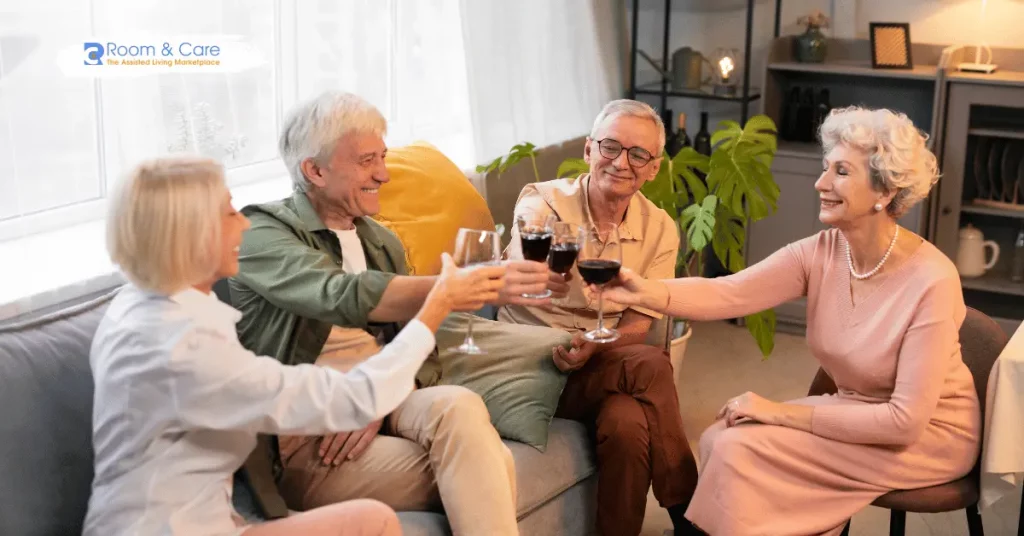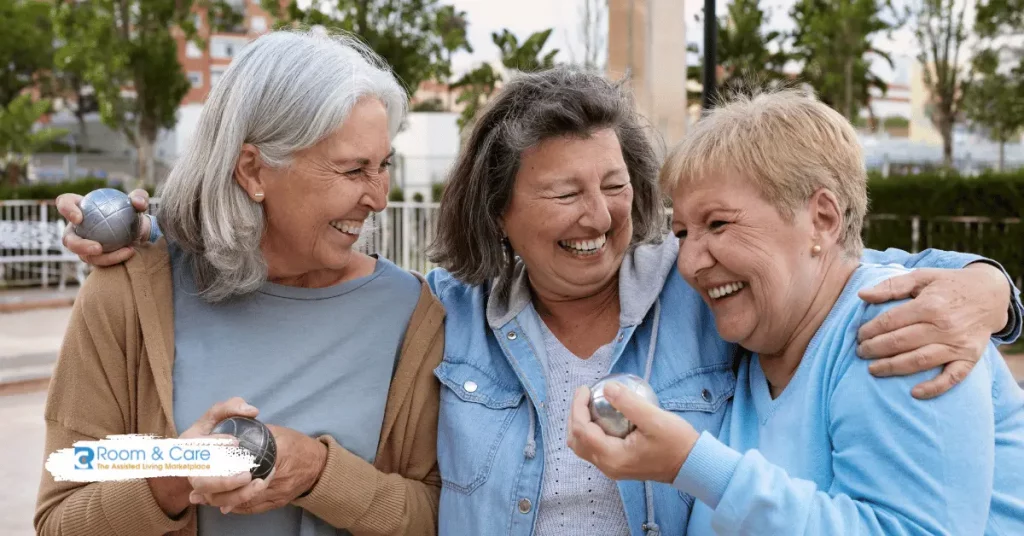

Reaching the age of 60 and beyond is an exciting phase of life filled with new opportunities for personal growth and connection. While it may seem challenging to make new friends after 60, this period can be one of the most rewarding times to expand your social circle. In fact, maintaining strong social connections is vital for your emotional, mental, and physical well-being.
In this comprehensive guide, we’ll explore practical and effective ways to make friends after 60. Whether you live independently, in an assisted living facility, or an adult family home, this article will provide actionable tips and insights to help you create meaningful friendships that will enhance your quality of life.
Friendships play an essential role in every stage of life, but they become even more crucial as we age. Studies show that seniors with active social lives are less likely to experience depression, anxiety, or cognitive decline. Engaging with others can lower the risk of heart disease, boost the immune system, and even extend life expectancy. But beyond these health benefits, friendships bring joy, laughter, and a sense of purpose.
However, it’s common to face hurdles in making new friends after 60. Retirement often means leaving behind professional networks, and lifestyle changes such as relocation or health issues can lead to feelings of isolation. But don’t worry—it’s never too late to build new connections. Let’s dive into the strategies that can help you find new friends and nurture those relationships.
If you are looking for an environment that encourages social interaction, consider an independent living community. These communities provide a range of social opportunities designed to help residents connect with each other. From organized social events like movie nights, game nights, and cultural outings to hobby-based groups and fitness classes, independent living communities offer multiple avenues to meet new people and make friends.
Being in a community where residents are in a similar stage of life can help you find common ground and spark conversations. Moreover, independent living communities often have common areas like lounges, libraries, and gardens where spontaneous social interactions can happen naturally.
Adult family homes are smaller, residential-style facilities where a limited number of residents live together, often forming close-knit relationships. This more intimate setting can make it easier to bond with others, as you will see the same faces daily. Regular shared activities, such as communal meals, gardening, or group exercise sessions, provide opportunities for relaxed, informal conversations that can develop into meaningful friendships over time.
If you need some assistance with daily activities but still want to stay socially active, assisted living facilities are a great option. These communities cater to your care needs while also offering numerous social activities. Residents can participate in group outings, arts and crafts sessions, music therapy, pet therapy, and more. Staff members are often skilled in facilitating social interactions and ensuring that all residents feel included.
Whether you are in an independent living community, an adult family home, or an assisted living facility, these environments offer unique opportunities to connect with others who share your interests, experiences, and outlook on life.

Community activities are a great way to meet new people and form connections. Look for local clubs, classes, or groups that align with your interests. This could be a book club, a gardening group, a painting class, or even a walking club. Engaging in activities that you enjoy naturally brings you closer to people who share your passions. This shared interest provides a solid foundation for building friendships.
Volunteering is another excellent way to meet people and make new friends. Many organizations actively seek seniors to assist with community events, mentor younger individuals, or support local causes. Volunteering not only allows you to give back to your community, but it also provides a sense of purpose and offers opportunities to meet like-minded individuals. Look for volunteer opportunities at local schools, hospitals, libraries, and community centers.
While in-person connections are invaluable, technology can also play a significant role in helping you make friends after 60. Consider joining social media platforms like Facebook or specialized online communities like Meetup, which focus on connecting people based on shared interests. Video calls via Zoom or Skype can help you stay connected with distant friends or family, or even foster new friendships with people who share your hobbies or interests.
Attending local events is an easy and enjoyable way to meet new people. Look for events that cater to your interests—such as local fairs, music festivals, cultural events, or workshops. Community centers, libraries, and places of worship often host events specifically for seniors. These gatherings provide a relaxed setting for you to start conversations and build relationships.
Starting a new hobby or revisiting an old passion can be a fantastic way to meet new friends. Consider joining a class or club related to your hobby, such as a photography group, a knitting circle, or a dance class. Engaging in shared activities not only gives you something to talk about but also helps you connect with people who enjoy the same things as you.
Friendliness goes a long way when making new friends. Smile, make eye contact, and be open to small talk. Even simple gestures like greeting your neighbors or saying hello to someone in a shared space can lead to more meaningful conversations. When people perceive you as approachable and friendly, they are more likely to engage with you.
Many communities have senior centers or organizations that host events, activities, and clubs tailored to older adults. These groups are an excellent way to meet new friends in a relaxed and welcoming environment. Senior groups often offer a variety of activities, such as exercise classes, educational workshops, travel groups, and card games—providing ample opportunities to connect with others.
Don’t be afraid to take the first step and invite someone to do something. Suggest going for coffee, attending a local event, or simply taking a walk in the park. Many people feel the same desire for friendship but may hesitate to make the first move. By taking the initiative, you open the door to forming new connections.
Many seniors feel shy or anxious about making new friends, especially if they have experienced loss or rejection in the past. Understand that these feelings are normal and that others likely feel the same way. Start with smaller social settings, such as intimate group activities or one-on-one meetups, to build confidence gradually. Remember, everyone feels nervous at first, but the more you practice, the easier it becomes.
Mobility or health issues can make it challenging to attend social gatherings, but there are still ways to connect with others. Many senior living communities offer on-site activities that cater to various physical abilities. If you’re living independently, look for accessible community programs or online social groups. Virtual events and social media platforms also offer a way to interact with others from the comfort of your home.
While it’s essential to stay socially active, it’s also important to maintain personal boundaries. Decide how much time and energy you want to invest in social activities and communicate your preferences clearly. Friendships should enrich your life, not become a source of stress or obligation. Find a balance that allows you to enjoy social connections while also respecting your need for privacy and alone time.
Independent living communities are designed with social interaction in mind. They offer various amenities and activities to help residents stay engaged, from fitness centers and swimming pools to movie theaters and art studios. By participating in these activities, you have multiple opportunities to meet new people and form friendships.
Adult family homes provide a smaller, more intimate environment that can make it easier to get to know others. With fewer residents, there’s a greater chance to form close bonds through daily interactions, shared meals, and group activities. The home-like setting fosters a sense of community and belonging, making it a perfect place to build strong, lasting friendships.
Assisted living facilities offer both care and companionship. With a focus on socialization, many facilities organize activities like fitness classes, gardening clubs, or pet therapy sessions. These activities are not only fun but also provide a chance to meet other residents who share similar interests. Additionally, the presence of caregivers and staff creates a supportive environment where everyone is encouraged to engage socially.
Building new friendships later in life offers many emotional benefits. It can help alleviate feelings of loneliness, provide emotional support during challenging times, and increase feelings of joy and fulfillment. Strong friendships also promote a sense of belonging and purpose, which is crucial for overall well-being.

Q: Is it difficult to make new friends after 60?
A: While it can feel challenging, it’s certainly not impossible. The key is to stay open-minded, take initiative, and look for opportunities that align with your interests.
Q: How do I make friends if I’m an introvert?
A: Start small by joining a group with fewer people or engaging in one-on-one conversations. Choose activities that interest you, which naturally makes it easier to connect with others.
Q: Can I make friends in a senior living community?
A: Yes, senior living communities are specifically designed to foster social connections. They offer various activities and common spaces that encourage interaction among residents.
Q: What if I’m not comfortable with technology?
A: You don’t have to be a tech expert to benefit from online connections. Start with simple platforms like Facebook to connect with old friends or find local groups with similar interests. Many libraries and senior centers offer free classes on using social media and video call tools.
Making friends after 60 is not just possible—it can be a wonderfully enriching experience. By staying active, engaging in activities that interest you, and being open to new experiences, you can build a fulfilling social circle that enhances your life in countless ways.
If you’re exploring senior living options that offer plenty of social opportunities, consider visiting Room and Care. Our platform connects you with the best-assisted living facilities, adult family homes, memory care facilities, nursing homes, and independent living communities—all without referral fees or middlemen, which helps you save money and ensures direct access to quality care.
Don’t wait—start taking steps today to build meaningful friendships that will make your golden years truly shine.